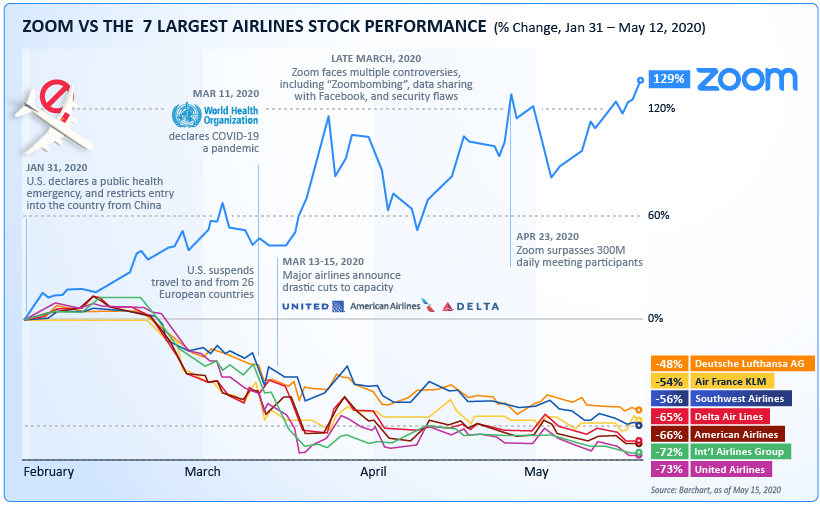Airports and airlines are continuing to navigate their way through the various recommended practices and governmental requirements, causing more confusion than clarity amongst the travelling public. Quarantine requirements adds another layer to a very confused landscape making it difficult for businesses to make any travel decisions.
As happened with security post 9/11, until there is a uniform and accepted standard for biosecurity across the globe, there will continue to be a lack of confidence for anyone considering getting on a commercial aircraft with business travel likely to suffer more than leisure.
As Ben Baldanza, former CEO of Spirit Airlines, predicted in a CNBC interview, business travel is likely to lose between 5-15% of its pre-virus traffic. "I can see some permanent or longer term lag to bring back business travel," he said. "I actually worry more about the business travel long-term than the leisure travel… You're not going to take your vacation through Zoom or Skype."
In these difficult days, there are a number of businesses that have been using private aircraft for their top level staff, ensuring they can travel to important face to face meetings while the pandemic is still in full force. Is this something that could see an uptick as commercial aviation continues to stumble along without a clear biosecurity path to follow?
There are a number of reasons why taking a private aircraft makes good business sense. A study conducted by European private jet charter operator Global Air, found that transiting a commercial passenger terminal and flying a commercial airline creates around 270 possible person-to-person interactions where you can be exposed to Covid-19. That compares to less than 20 when taking a private flight. A good reason in itself.
Other good reasons include convenience and the time taken. As time often equates to money, the least time travelling the better and can easily balance the initial cost. As private aircraft generally operate from local airports and don't require check-in hours beforehand, the total travel time is considerably reduced. Security screening is much quicker and if the executive is running late then the plane won't leave without them. If there's a need to travel to multiple cities, then the use of a private aircraft removes the need to schedule in hotel nights.
Working on a plane is almost a given but many commercial aircraft don't have WiFi, especially not short haul, but all private aircraft do so working during the entire flight is easier. Plus privacy is complete so easier to get that confidential work done without the fear of someone looking over your shoulder.
The cost of private flying may be high but with the cost of aviation fuel at its lowest for some years so the price of a private flying is decreasing. But will the reduction in price be enough to lure more corporates onto private aircraft given the downturn in business around the world?
There may be lots of talk of staff furloughs and closures, but not everyone is laying off staff and many businesses actually thrive in these current circumstances. Since the start of the year the market value of US communications technology company Zoom has almost quadrupled as its share price has risen from USD68.72 on 02-Jan-2020 to a high of USD242.56 this week.
CHART - Not everyone is struggling during the current pandemic - Zoom is now worth more than the world's seven biggest airlines combined Source: Visual Capitalist
Source: Visual Capitalist
There are others too such as Walmart and Amazon (the latter founder and CEO Jeff Bezos's net worth has apparently increased by USD24 billion in recent weeks). While air transport may have stopped, the world is still doing business and the leaders of these companies are still moving around, and private aviation has been facilitating much of this movement.
According to Athar Hussain Khan, secretary general of the European Business Aviation Association, private aircraft could be "one of the first movers because of our flexibility and agility, and the fact that we can start operations swiftly will certainly have its impact on the market".
The European Business Aviation Association represents the on-demand airline market from corporate jets to emergency medical flights. Of course the market has decreased along with commercial aviation, but at the beginning of May "more than 40% of traffic in Europe… is facilitated by business aviation," Khan said, compared to the 8% it usually accounts for.
Private aviation is certainly a possibility for some companies with a good cash flow and a need to get in front of clients. Zoom and Skype will have their uses but human interaction is still wanted and remains an essential part of the business formula, albeit a touchless experience that is completed from a safe social distance and perhaps with a mask.
It may take time for corporate travel to get back to pre-Covid-19 levels, and private aviation may have a short window until commercial aviation steadies the ship. Affordability is a big issue, but it is definitely an option right now, albeit that might just be for a small niche of users.